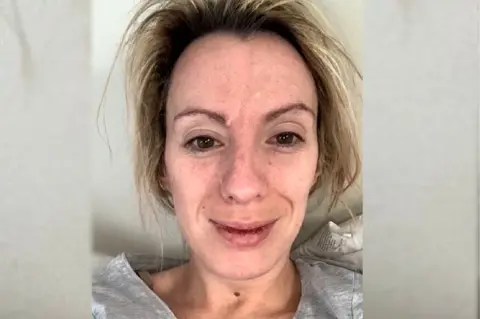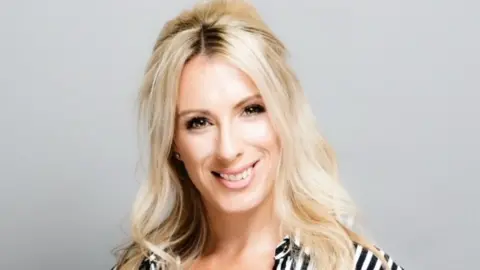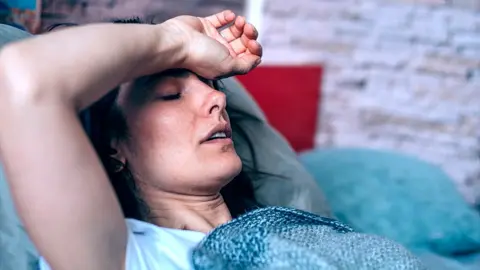Long Covid: I'll take trial drugs because I want my life back
 Kate Stott
Kate StottLong Covid has stolen Kate Stott's life.
Since catching coronavirus in March 2020, the mother-of-three, 35, has lost her business, her health and precious family moments with her children.
She knows well the moment everything turned: "I went to bed with a sore throat two years ago, and that was it."
She told BBC Radio Scotland's Drivetime programme: "I still wake up every morning wanting to do it all.
"I still want to be the mum that takes them to school, I still want to be the one that picks them up from school. I still want to run around the park with them at the weekends and I still can't quite believe that's not me."
When Kate, from Aberdeen, first fell ill there were no tests. She pushed through.
"I worked from my bed," she said. "Nobody knew how ill I was. I kept it to myself to keep the business going."
 Kate Stott
Kate StottKate founded the Beauty Booker app and won business awards for her work. She supported over 2,000 hair and beauty businesses throughout the pandemic, relaying government advice throughout the restrictions.
But last summer she was taken into hospital after developing neurological symptoms.
"I had fatigue, I couldn't lift my head, there was dizziness, my heart would race.
"I had ptosis in my left eye - the muscle drops if I am over-tired. I have double vision, I find it hard to walk. My chest can feel like it is full of cement."
Kate has now been officially diagnosed with Long Covid. She has to use crutches to get around.
"The neuro symptoms are the worst - when you are experiencing brain fog, forgetting people's names, not being able to help the kids with their homework, that's when you start to worry. I really didn't feel in control."
Kate has now seen a series of different specialists: "I had to see a rheumatologist for my joints - I couldn't move - the gastroenterologist, a heart specialist and most recently, a neurologist.
Some of those specialists she has had to see privately and Kate has spent more than £2,000 trying to get better.
Her work has become impossible. She cannot focus on emails and forgets how her company computer system is laid out. It led to a difficult decision.
She said: "Within the last two weeks I had to announce that we were taking the platforms offline. It's something I have come to terms with. For just now it's just not something that is possible to do."
She feels for her children.
 Beauty Booker
Beauty BookerShe said: "It's had a huge impact on them, not being able to have mum out with them playing, They are always asking me when are you going to get better mum, can we do this when you are better, and can we go on holiday?
"The reality of it now is if we are speaking about holidays, there is a possibility I am going to need a wheelchair if I want to go away with my kids. To accept it is difficult because I went to bed with a sore throat two years ago, and that was it. "
Kate now believes drug trials may be her only hope of getting her life back.
"I am willing to do that because it is the fastest way to get something that may work. I am prepared to do that because I want my life back - immediately."
More than 132,000 people in Scotland now have Long Covid.
Kate is calling for better research into treatments and more understanding from health services.
 Getty Images
Getty ImagesMartin McKee, professor of European public health at the London School of Hygiene and Tropical Medicine said: "We know a lot more than we did but there are still an awful lot of questions.
"We may be able to treat some elements of it but there is unlikely there will be a magic bullet, one single treatment. People are still getting infected with Covid and we are now running at perhaps 1.5m people who have Long Covid in the UK.
"If we continue to have recurring waves we are going to have a substantial burden of ill health. We do need something but it's not going to be simple."
The Scottish government said it was determined everyone with Long Covid would get the care and support they needed.
A spokeswoman said: "Support is already being delivered for those suffering across our full range of NHS services, including primary care, community based rehabilitation services and referral to secondary care for further investigation and support where required.
"We have established a national Long Covid Strategic Network bringing together clinical experts, NHS Boards and those with lived experience to guide how we plan and design care and ensure our £10m Long Covid support fund is targeted at the areas where additional support can make the biggest difference."
She said that the Scottish government was funding nine Scottish-led research projects on the longer-term effects of Covid-19 with a total funding commitment of £2.5m.
